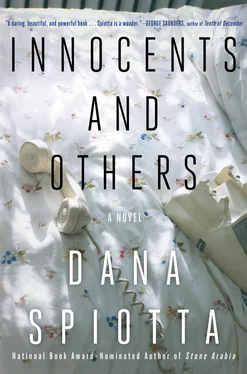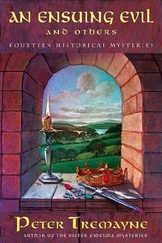Dana Spiotta - Innocents and Others
Здесь есть возможность читать онлайн «Dana Spiotta - Innocents and Others» весь текст электронной книги совершенно бесплатно (целиком полную версию без сокращений). В некоторых случаях можно слушать аудио, скачать через торрент в формате fb2 и присутствует краткое содержание. Год выпуска: 2016, Издательство: Scribner, Жанр: Современная проза, на английском языке. Описание произведения, (предисловие) а так же отзывы посетителей доступны на портале библиотеки ЛибКат.
- Название:Innocents and Others
- Автор:
- Издательство:Scribner
- Жанр:
- Год:2016
- ISBN:нет данных
- Рейтинг книги:5 / 5. Голосов: 1
-
Избранное:Добавить в избранное
- Отзывы:
-
Ваша оценка:
- 100
- 1
- 2
- 3
- 4
- 5
Innocents and Others: краткое содержание, описание и аннотация
Предлагаем к чтению аннотацию, описание, краткое содержание или предисловие (зависит от того, что написал сам автор книги «Innocents and Others»). Если вы не нашли необходимую информацию о книге — напишите в комментариях, мы постараемся отыскать её.
Innocents and Others — читать онлайн бесплатно полную книгу (весь текст) целиком
Ниже представлен текст книги, разбитый по страницам. Система сохранения места последней прочитанной страницы, позволяет с удобством читать онлайн бесплатно книгу «Innocents and Others», без необходимости каждый раз заново искать на чём Вы остановились. Поставьте закладку, и сможете в любой момент перейти на страницу, на которой закончили чтение.
Интервал:
Закладка:
Marvin’s speech, true or not, was the most vital moment in the film. Meadow framed it, set it up, gave Marvin the last word. Because his was the best.
* * *
In the first cut of her film, the professor looked like something out of The Crucible and Marvin looked like a victim. Meadow edited it again to make it more complex — she placed a convincing and weeping and nearly contrite Guardsman at the very end, after Marvin. Meadow thought that it was okay, this interaction with real lives. Look, look. It’s okay. She was raising questions, and if they made people uncomfortable, all the better.
She filmed one more scene. Her cameraman filmed Meadow editing with her photogenic assistant, Kyle. The camera showed Meadow and Kyle watching a playback: the professor clip followed by the Marvin bit.
Meadow says, “Marvin’s so convincing but it isn’t just about Marvin. Can you call up the Guardsman who admits guilt?” Kyle nods. “Let’s slip him in at the end. Make him the last word to complicate Marvin’s story a little.”
“What about one of the survivor students?” Kyle says.
“Naw. We all know how we feel about them.”
“What?”
“Bad. We feel bad about the students. They feel bad. It is too easy. The Guardsman? Marvin? We feel bad in a more interesting way. Let’s end with them.”
Then the film shows a repetition of the crying Guardsman, and then the film ends. Meadow knew this was a fake ending, but it was a fake ending that admitted its fakeness instead of hiding it. Then she thought it too jarring to have herself only at the end. She and Kyle went back and inserted film and audio of her throughout. Her questions. The back of her head as she worked to animate still photos. Her filming new footage on the quad. She showed some of the strings, but not all of them, of course — it was still a highly constructed thing. An essay more than a neutral rendering. It had a point of view. A film is an idea about the world. Meadow thought of it like that, but she also knew that people can know something and visual images will override anything they know. Cinema truth is deceptive that way. It can tell you something but show you something very different. And you can bet you will walk away believing in what you saw. She thought she should make this problem an explicit part of her film. The way to manage a problem is not to solve it, which is impossible, but make the problem the material of the film.
After a few weeks, she had Kyle go back and cut out all the scenes of her. The fake footage watching her watch her own movie was too similar to her strategy on the Deke film. All that self-reflexivity seemed narcissistic to her and, well, too obvious. After all, the title said “A Film by Meadow Mori” right on it. Of course it was cut a certain way, constructed by her. Of course it had fraught objectivity; it was constructed of first-person points of view.
Kent State: Recovered took four years to research, shoot, edit, and promote. When it finally was shown, she waited for people to say it was manipulative and false. Objections. But that’s not what happened. Maybe it had something to do with the timing: the film was first shown in September, right after President Bush launched the initial stages of Desert Storm. War was on everyone’s mind, and Kent State: Recovered struck a nerve with some critics. It won several prizes, and in the winter, after everyone watched the clinical footage of the Desert Storm air strikes, the film was nominated for an Academy Award for Best Feature Documentary. Carrie was the first one to call.
“I can’t believe it!” Carrie screamed into the phone. Meadow laughed. “I mean, I can believe it because you’re a total genius, but I mean I can’t believe that the world finally caught on. Oh, Jesus, you know what I mean.” Carrie screamed again. “Tell me everything,” she said.
“Some interviews and write-ups. Runs scheduled in LA, New York, and San Francisco.”
“That’s great!” she said.
“Yeah,” Meadow said. “How’s your movie going?” Carrie’s student short, Girl School , won enough prizes that Carrie was able to find backing from a small independent production company to make a feature-length film based on it. She had asked Meadow to work on Girl School , but Meadow said she was too busy. The truth was that Meadow thought it was a little silly, and the way Carrie planned to film and edit it was too conventional and boring to her.
“Great,” Carrie said. “We start shooting in three weeks.”
Meadow took Kyle to the awards as her date, and they had fun because they were pretty certain they would lose (although Meadow had a breathless moment when the nominees were being read). In the last few weeks, some people in the Academy and in various established critical circles objected to the fictional footage and animations used in the film. It wasn’t a “true” documentary. It didn’t matter; she was now making films that people would watch. No longer just a kid fooling around. Not everything changed for Meadow, not the way she thought it might. The problems of making films were still there; it didn’t make her any better. But now she had this thing, this credential, and it helped her get money, get access, get trust.
Aborted Desoto Film Project
While working on Kent , she remembered an underground filmmaker she had first heard about in high school, Bobby Desoto. He made some amazing short films in 1970 and 1971, but he was mostly famous for vanishing after a protest bombing he was involved with in 1972. Meadow attempted to locate him. She spent some time in California, where he grew up, and then later in the Northwest. But she couldn’t get anyone to talk to her. Not his family and not his friends. It was a dead end, and she gave up on it. However it wasn’t a total waste of time: she ended up using clips from his films in Kent State: Recovered.
Play Truman (1993)
Meadow made Play Truman quickly. It was a short speculative film essay about the dropping of the second atomic bomb. Historical footage of Truman and Nagasaki were intercut with an actor in a room, which was Meadow herself in a suit as Truman. She read from Truman’s journal. As Meadow went into Truman’s biography, she showed archival film clips of regular people in their homes, rare films made in the early part of the century with very early hobby cameras, which she hoped conveyed a sense of the American middle-class security that Truman came from. She intercut these with home films of 1940s ordinary Japanese people — not exactly home films, but they appeared that way: a woman in a garden, children playing. She used intertitles and tinted some of the images to make them individual but also of a piece. As she showed these images, she read from Truman’s journal to show how he made the case to himself that the continued fire-bombing of cities was worse than dropping an atom bomb. She let her Truman make his case, but the dropping of the second bomb gave the lie to most of the reasons. Still she caught, somehow, the way this unimaginable and world-changing power fell into Truman’s hands, a man who didn’t even know the bomb existed before his predecessor died. She felt his raw humanness melt away as he decided who would live and who would die. It made her shudder, pretending to be Truman. The film was her hybrid projection, a leap from her earlier reenactments to something else. And no one knew what to make of it. It was fantasia more than documentary, and it hardly got shown, won no prizes. It was clearly not what people wanted from her after her Kent State film, which made her feel pleased in a complicated way.
* * *
After the success of Kent State: Recovered , the failed Desoto project, and the perverse satisfactions of Play Truman , Meadow decided to take some time to consider what her new project might be. She flew home to LA for the first extended visit with her parents in years. Meadow slept in her old room, and she walked through her old life as if she had never left. She wanted to, somehow. She let herself regress a little: watching videos and movies on TV, smoking on the patio in the cool desert night, drinking expensive white wine with her mother, and even going shopping. She spent hours at the flea market looking at old things. She picked up broken vintage electronics, sorted through boxes of ephemera, bought a number of obsolete devices. Whatever caught her eye and interested her. She put the things she bought in her bedroom and arranged them on a low shelf. She flipped through a box of old postcards and read the notes from long-dead people. She spent days like this.
Читать дальшеИнтервал:
Закладка:
Похожие книги на «Innocents and Others»
Представляем Вашему вниманию похожие книги на «Innocents and Others» списком для выбора. Мы отобрали схожую по названию и смыслу литературу в надежде предоставить читателям больше вариантов отыскать новые, интересные, ещё непрочитанные произведения.
Обсуждение, отзывы о книге «Innocents and Others» и просто собственные мнения читателей. Оставьте ваши комментарии, напишите, что Вы думаете о произведении, его смысле или главных героях. Укажите что конкретно понравилось, а что нет, и почему Вы так считаете.












